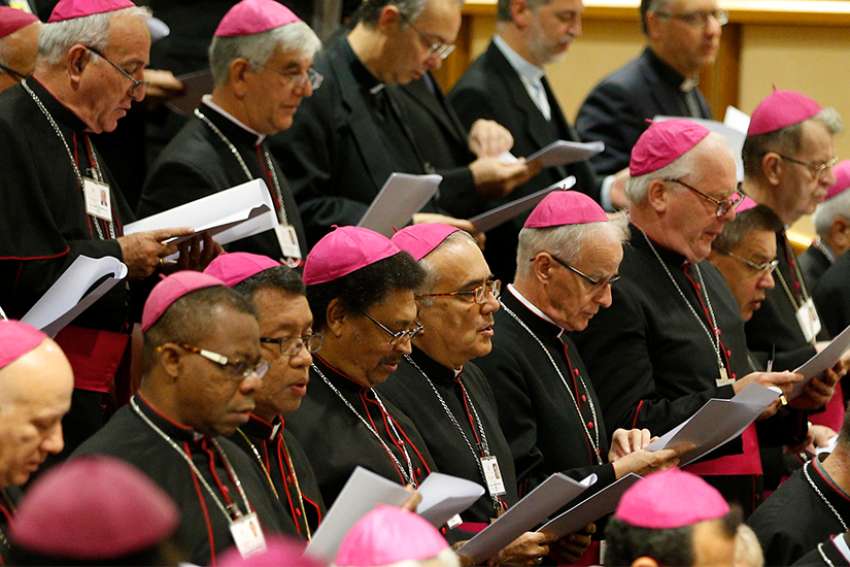Bishops attend a session of the Synod of Bishops on young people, the faith and vocational discernment at the Vatican Oct. 23.
CNS photo/Paul Haring
'Synodality' a chance for bishops, faithful to be involved in Church governance
By Catholic News Service
VATICAN – Synodality is about more than just bishops participating in the governance of the church; it encourages the involvement of all the faithful in a spirit of collaboration, said Archbishop Hector Miguel Cabrejos Vidarte of Trujillo, Peru.
During an Oct. 25 briefing with journalists, Archbishop Cabrejos said that "synodality" was a theme that was heavily discussed throughout the Synod of Bishops.
Synodality, he said, is more than just a word; it's a way of life for the church that "promotes everyone's participation."
"When I say everyone, I don't just mean the church as in the bishops, priests. No! It is also the laity and the faithful at all levels. And all of us bishops are called -- and this is part of that synodality -- to make collaboration grow," Archbishop Cabrejos said.
"The church," he added, "is not having a synod for youth, but with youth."
The archbishop, who also serves as president of the Peruvian bishops' conference, explained that synodality involves the entire church "walking together" not only with young people who are in the church but "also with those who are far, with nonbelievers."
"The word that best describes synodality is walking; walking together not just as a church, not just as a youth group, not just as a priest, not just as a religious congregation for men and women or a lay group. It is walking together. And I think the clear image is that we bishops are called" to foster growth, participation and synodality.
Austrian Cardinal Christoph Schonborn of Vienna was asked Oct. 26 about the difference between "synodality" and the "collegiality" the Second Vatican Council saw a need to strengthen.
Collegiality involves all the bishops together and with the pope exercising their leadership as successors of the group of Twelve Apostles chosen by Jesus, he said. "Synodality is a much wider notion," one that recognizes that each Christian, by virtue of his or her baptism, has something to contribute to the life and mission of the church.
Some bishops had complained that "synodality" was a theme given much more attention in the first draft of the synod's final message than it warranted based on only a few mentions of the term in the synod's discussions. But, the cardinal said, "it is what we have been doing for a month."
Another major topic of discussion during the synod was the scandal of sex abuse and abuse of power within the church, an issue that Brazilian observer Lucas Barboza Galhardo said "bothered us young people a lot."
"There is no space for it (in the church); it can't happen it any form," Barboza said. "We hope that there will be concrete measures by all the (bishops') conferences and local churches so that it never happens again."
Barboza told journalists that it is "a great challenge" today for young Catholics like him to defend the church "in this situation" especially when speaking to friends who are not in the church.
"At times when we talk, the first thing they talk about are these negative situations," he said.
Nevertheless, he said, young men and women in the church have a mission to proclaim to the world that the image of "this church of abuse of power is not the church of Jesus Christ, it is not the church that we live in and it is not the church that we share."
"This isn't the church that at least I and the majority of young people believe in. The church that we believe in and that we feel we live in and share is a church of joy, a church of love, a synodal church that walks together with us, that listens to us, that is close to us.
This experience, he said, "is the wealth that we young people want to share with everyone."
Tagged under:
Please support The Catholic Register
Unlike many media companies, The Catholic Register has never charged readers for access to the news and information on our website. We want to keep our award-winning journalism as widely available as possible. But we need your help.
For more than 125 years, The Register has been a trusted source of faith-based journalism. By making even a small donation you help ensure our future as an important voice in the Catholic Church. If you support the mission of Catholic journalism, please donate today. Thank you.
DONATE

